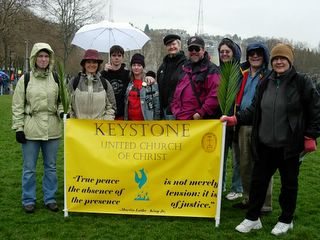Mr. Thel is a big fan of Rush. (The rock band, not the windbag.) He recently bought a book (Ghost Rider) about the epic motorcyle trip the band's drummer, Neil Peart, embarked upon after the deaths of his daughter and wife. I picked up the book and almost immediately found a nice description of my own social clumsiness:
I confess that I am one of those people who, in a deep and secret place, can never imagine why anyone would actually like them. Respect maybe, or even appreciate, but not really care for. This...is not about self-esteem or pride... but it is more a sense of one's ineptitude in the social graces, a perceived "disability" in what seemed to be the normal social routines of being charming, funny, entertaining, and forthcoming with another person.
This existential discomfort causes more social awkwardness than the contrary self-image (as evinced by one friend of mine who, in that same deep and secret place, can't imagine why anyone wouldn't like him.) And for those of us who feel deficient in such socially valued qualities, it can also be that the effort of opening ourselves up to another is so difficult we're willing to at least attempt the operation in close relationships, but not for casual encounters. [author's italics;bold added]
That's me! Being charming, funny, entertaining, and
forthcoming with another person" is such an effort that I avoid it whenever possible. It's not as hard with people I'm close to--people with whom I feel a comfortable familiarity, having already done the hard work of chopping through the initial awkwardness. Everyone has to spend time "breaking the ice," of course, but the normal time allotted for that process implies that this is flimsy ice, a thin film easily broken, and that I who need an Arctic ice-breaking ship to cut a sufficient passage into friendship am feeble and broken, myself.
I do have manic bursts of social frenzy that would belie my introversion, except that when the night is over or the party has wound down I am utterly exhausted. I may have had a great time, and be glad I made myself attend, but I'll be wiped out from the effort.
I need to learn either how to be comfortable with this, to be happy with one or two close friends, or how to stretch myself without breaking, because as it is I'm stuck in a bit of a cycle:
Step one: Spend a week without having a serious conversation with anyone.
Step two: Realize I have spent a week without having a serious conversation with anyone.
Step three: Feel lonely and anxious about small number of close friendships.
Step four: Worry that this lack reflects serious flaws in myself.
Steps five and six: Repeat steps three and four.
Step seven: Arrange social outings for near future to remedy this flaw.
Step eight: Attend social outing: spend evening talking, laughing, and making merry.
Step nine: Collapse, exhausted, into bed.
Step ten: Review every word and gesture during social outing, finding much to criticize. Ponder the ineptitude and cluelessness that have ended past friendships, and decide it's too risky and unpleasant to continue this game.
Lather, rinse, and repeat!
I would like to find a balance, to be comfortable that there are a number of people with whom I feel I can be myself--my true, warty, socially awkward, occasionally goofy and strident self--and slowly stop feeling broken for my inability to make that number huge.





